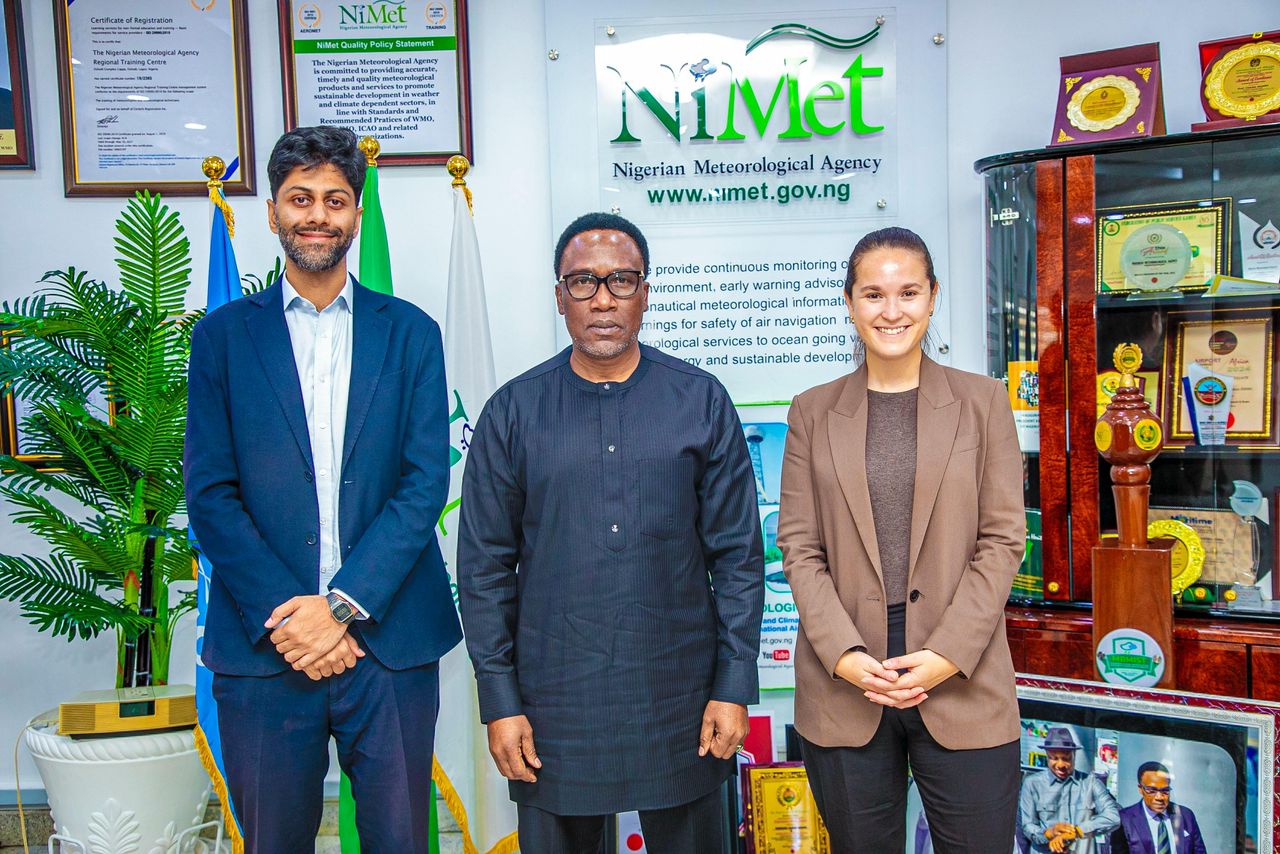NiMet Partners AIM for Scale to Deploy AI-Powered Weather Forecasting for Nigerian Farmers

…Anosike pledges stronger, data-driven climate information services to boost agricultural productivity
The Nigerian Meteorological Agency (NiMet) has reaffirmed its commitment to harnessing Artificial Intelligence (AI)-driven weather forecasting to enhance the accuracy and accessibility of climate information for Nigerian farmers.
This commitment was restated by the Director General and Chief Executive Officer of NiMet, Professor Charles Anosike, during a courtesy visit by a delegation from the Agricultural Innovation Mechanism for Scale (AIM for Scale) team to NiMet headquarters in Abuja.
The AIM for Scale team, led by Imara Salas, Director of the AIM for Scale Secretariat, and Mohammad Farrae, Scientific Director, met with NiMet’s management to explore potential areas of collaboration aimed at improving weather services for agricultural communities across Nigeria.
AIM for Scale is a consortium of international partners dedicated to scaling agricultural innovation and weather services for farmers globally. The initiative brings together leading organisations such as the Bill & Melinda Gates Foundation, United Arab Emirates (UAE), Asian Development Bank (ADB), Inter-American Development Bank, World Bank, U.S. Agency for International Development (USAID), NASA, Massachusetts Institute of Technology (MIT), Community Jameel, Mohamed bin Zayed University of Artificial Intelligence (MBZUAI), University of Chicago’s AI for Climate (AICE) initiative, World Meteorological Organization (WMO), and the United Nations Systematic Observations Financing Facility (SOFF).
According to AIM for Scale, the collaboration with NiMet will focus on co-developing strategies for scaling up weather services, mobilising investments, and delivering AI-based forecasting tools tailored to Nigerian farmers’ needs. The initiative is designed to equip farmers with real-time, actionable weather data to guide planting and harvesting, reduce risks, and enhance productivity.
Speaking during the meeting, Imara Salas expressed appreciation to NiMet for its warm reception and reaffirmed the consortium’s goal of deploying advanced forecasting systems that can serve millions of farmers efficiently.
She explained that AIM for Scale adopts a vertical fund-style approach to agricultural innovation by creating tailored packages that merge AI technologies, data analytics, and investment mobilisation to make climate information more accessible and impactful.
“Our focus is to design scalable, cost-effective weather solutions that empower farmers with the right information at the right time,” Salas said. “Partnering with NiMet offers a great opportunity to expand these solutions in Nigeria and across Africa.”
In his response, Professor Charles Anosike commended the inclusion of Nigeria in AIM for Scale’s first African pilot project and expressed gratitude for NiMet’s participation in the recent AI Weather Training held in Abu Dhabi.
He underscored NiMet’s readiness for the collaboration, highlighting the agency’s technical expertise and institutional commitment to advancing accurate weather and climate services.
“AI-powered forecasting will revolutionise how we deliver weather and climate information to farmers,” Anosike noted. “With advanced algorithms, we can improve accuracy, enhance speed, and ensure that smallholder farmers get timely, reliable data to make informed agricultural decisions.”
He, however, pointed out some critical challenges that could limit the rapid expansion of such services, including the limited network of in-situ weather stations across Nigeria and the urgent need to expand radar coverage for more comprehensive monitoring.
Following the meeting, the AIM for Scale team was conducted on a guided tour of NiMet’s central forecasting facility, where they observed the agency’s operational systems and infrastructure. The visit provided practical insights into NiMet’s existing capacities and the areas where collaboration could further strengthen national forecasting systems.
Both parties concluded the visit with an agreement to draft and sign a Memorandum of Understanding (MoU) to formalise joint research activities and foster operational sustainability.
The MoU, once finalised, will serve as a framework for long-term cooperation in developing and implementing AI-driven weather forecasting solutions across Nigeria.
Professor Anosike reaffirmed NiMet’s determination to ensure that Nigerian farmers benefit from the next generation of weather intelligence, stressing that such innovation would not only enhance productivity but also support national food security and resilience against climate variability.
“By embracing new technologies and forging strategic partnerships like this, NiMet is positioning Nigeria at the forefront of modern meteorology in Africa,” he added.







